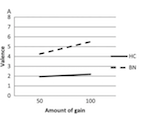Abstract
Objective
This study examined the underlying processes of decision-making impairments in individuals with anorexia nervosa (AN) and bulimia nervosa (BN). We deconstructed their performance on the widely used decision task, the Iowa Gambling Task (IGT) into cognitive, motivational, and response processes using cognitive modeling analysis. We hypothesized that IGT performance would be characterized by impaired memory functions and heightened punishment sensitivity in AN, and by elevated sensitivity to reward as opposed to punishment in BN.
Method
We analyzed trial-by-trial data of IGT obtained from 224 individuals: 94 individuals with AN, 63 with BN, and 67 healthy comparison individuals (HC). The prospect valence learning model was used to assess cognitive, motivational, and response processes underlying IGT performance.
Results
Individuals with AN showed marginally impaired IGT performance compared to HC. Their performance was characterized by impairments in memory functions. Individuals with BN showed significantly impaired IGT performance compared to HC. They showed greater relative sensitivity to gains as opposed to losses than HC. Memory functions in AN were positively correlated with body mass index.
Discussion
This study identified differential impairments underlying IGT performance in AN and BN. Findings suggest that impaired decision making in AN might involve impaired memory functions. Impaired decision making in BN might involve altered reward and punishment sensitivity.
